Related Research Articles

Laurence Kerr Olivier, Baron Olivier, was an English actor and director who, along with his contemporaries Ralph Richardson and John Gielgud, was one of a trio of male actors who dominated the British stage of the mid-20th century. He also worked in films throughout his career, playing more than fifty cinema roles. Late in his career he had considerable success in television roles.

Kenneth Gilbert More, CBE was an English film and stage actor.

Private Lives is a 1930 comedy of manners in three acts by Noël Coward. It concerns a divorced couple who, while honeymooning with their new spouses, discover that they are staying in adjacent rooms at the same hotel. Despite a perpetually stormy relationship, they realise that they still have feelings for each other. Its second act love scene was nearly censored in Britain as too risqué. Coward wrote one of his most popular songs, "Some Day I'll Find You", for the play.

Blithe Spirit is a comic play by Noël Coward, described by the author as "an improbable farce in three acts". The play concerns the socialite and novelist Charles Condomine, who invites the eccentric medium and clairvoyant Madame Arcati to his house to conduct a séance, hoping to gather material for his next book. The scheme backfires when he is haunted by the ghost of his wilful and temperamental first wife, Elvira, after the séance. Elvira makes continual attempts to disrupt Charles's marriage to his second wife, Ruth, who cannot see or hear the ghost.
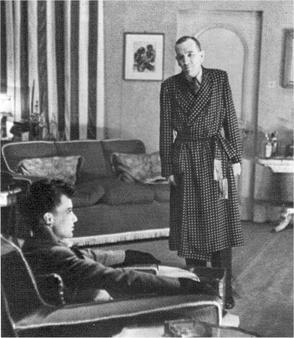
Present Laughter is a comic play written by Noël Coward in 1939 but not produced until 1942 because the Second World War began while it was in rehearsal, and the British theatres closed. The title is drawn from a song in Shakespeare's Twelfth Night that urges carpe diem. The play has been frequently revived in Britain, the US and beyond.

The Wednesday Play is an anthology series of British television plays which ran on BBC1 for six seasons from October 1964 to May 1970. The plays were usually original works written for television, although dramatic adaptations of fiction also featured. The series gained a reputation for presenting contemporary social dramas, and for bringing issues to the attention of a mass audience that would not otherwise have been discussed on screen.

Patrick Cargill was an English actor remembered for his lead role in the British television sitcom Father, Dear Father.

Joyce Carey, OBE was an English actress, best known for her long professional and personal relationship with Noël Coward. Her stage career lasted from 1916 until 1987, and she was performing on television in her 90s. Although never a star, she was a familiar face both on stage and screen. In addition to light comedy, she had a large repertory of Shakespearean roles.
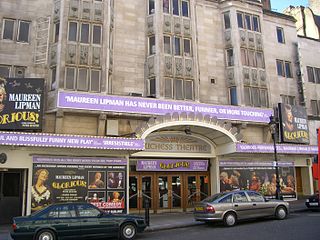
The Duchess Theatre is a West End theatre in the City of Westminster, London, located in Catherine Street near Aldwych.

Graham Payn was a South African-born English actor and singer, also known for being the life partner of the playwright Noël Coward. Beginning as a boy soprano, Payn later made a career as a singer and actor in the works of Coward and others. After Coward's death, Payn ran the Coward estate for 22 years.

Fallen Angels is a comedy by the English playwright Noël Coward. It opened at the Globe Theatre, London on 21 April 1925 and ran until 29 August. The central theme of two wives admitting to premarital sex and contemplating adultery met hostility from the office of the official theatre censor, the Lord Chamberlain, and the necessary licence was granted only after the personal intervention of the Chamberlain.
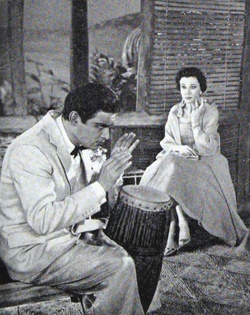
South Sea Bubble is a play by Noël Coward, described in the published text as a light comedy. It was written in 1949 but not performed until 1951, and not in its final form until 1956. Under the title Island Fling it was given in the US at the Westport Country Playhouse and the Cape Playhouse in Massachusetts in July and August 1951 with Claudette Colbert in the starring role. After a pre-London tour the British production opened at the Lyric Theatre in the West End in April 1956, starring Vivien Leigh. It ran for 276 performances.
Judith Anne Arthy is an Australian retired actress, and writer.
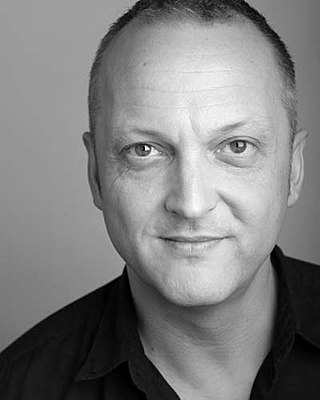
David Benson is an English theatre actor, writer and comedian.

Sir Noël Peirce Coward was an English playwright, composer, director, actor, and singer, known for his wit, flamboyance, and what Time magazine called "a sense of personal style, a combination of cheek and chic, pose and poise".
Roderick Cook was an English playwright, writer, theatre director and actor of stage, television and film. Cook is known for creating, directing and starring in the musical review Oh, Coward! and portraying Count Von Strack in the Oscar-winning film Amadeus.

A prolific playwright and successful actor and director, Noël Coward had a significant impact on culture in the English-speaking world. Time magazine said that he had a unique "sense of personal style, a combination of cheek and chic, pose and poise".
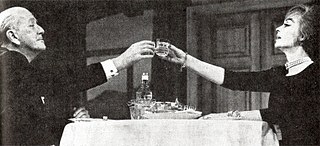
A Song at Twilight is a play in two acts by Noël Coward. It is one of a trio of plays collectively titled Suite in Three Keys, all of which are set in the same suite in a luxury hotel in Switzerland. The play depicts an elderly writer confronted by his former mistress with facts about his past life that he would prefer to forget.
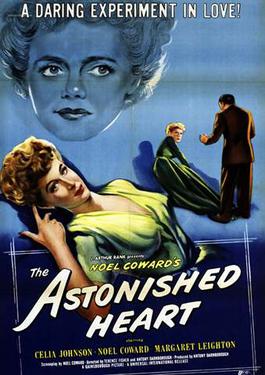
The Astonished Heart is a 1950 British drama film directed by Terence Fisher and Antony Darnborough. Starring Celia Johnson, Noël Coward, and Margaret Leighton, the film is based on Coward's play The Astonished Heart from his cycle of ten plays, Tonight at 8.30.
Androcles and the Lion is a 1967 American TV special. It is a musical adaptation of the George Bernard Shaw play Androcles and the Lion.
References
- ↑ Vagg, Stephen (16 April 2023). "Surviving Cold Streaks: Kenneth More". Filmink.
- ↑ More, Kenneth (1978). More or less. p. 214.
- ↑ Home, William Douglas (1979). Mr. Home pronounced Hume : an autobiography.
- ↑ Saunders, Peter (1972). The Mousetrap man. p. 202.
- ↑ Coward, Noel (2000). The Noel Coward Diaries. p. 669.
- ↑ Miller, Harry M (1983). My Story. p. 177.
- ↑ "Television tonight". Evening Post and News. 10 January 1969. p. 13.